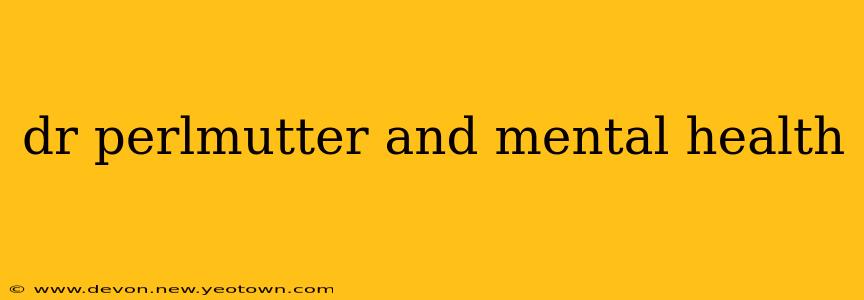Dr. Perlmutter and Mental Health: A Deep Dive into the Brain-Gut Connection
Dr. David Perlmutter, a renowned neurologist and #1 New York Times bestselling author, isn't just known for his expertise in neurology; he's a leading voice advocating for the crucial link between gut health and mental well-being. His work challenges conventional approaches to mental health, emphasizing the often-overlooked role of the gut microbiome in influencing brain function and mood. This isn't about replacing traditional mental health care; instead, it's about exploring a complementary approach that could significantly enhance treatment outcomes. Let's delve into the fascinating world of Dr. Perlmutter's perspective on mental health.
How does Dr. Perlmutter explain the connection between gut health and mental health?
Dr. Perlmutter's research and writings heavily emphasize the intricate communication network between the gut and the brain, often referred to as the gut-brain axis. He posits that imbalances in the gut microbiome—the trillions of bacteria, fungi, and other microorganisms residing in our digestive system—can significantly impact brain chemistry and neurological function. Imagine the gut as a second brain, constantly communicating with the central nervous system. When this communication system is disrupted, the consequences can manifest as various mental health challenges. This disruption can be caused by factors like poor diet, stress, lack of sleep, and overuse of antibiotics.
What are some of the mental health conditions Dr. Perlmutter connects to gut health?
Dr. Perlmutter's work connects numerous mental health conditions to gut dysbiosis (an imbalance in the gut microbiome). He discusses how an unhealthy gut can contribute to:
-
Anxiety: Inflammation and imbalances in gut bacteria can trigger the release of inflammatory cytokines, affecting neurotransmitter production and impacting mood regulation, potentially increasing anxiety levels.
-
Depression: Similar to anxiety, gut dysbiosis can disrupt the delicate balance of neurotransmitters like serotonin, a key player in mood regulation. A compromised gut can lead to reduced serotonin production, contributing to depressive symptoms.
-
Autism Spectrum Disorder (ASD): While research is ongoing, Dr. Perlmutter suggests that gut dysbiosis may play a role in the development and severity of ASD symptoms, highlighting the gut-brain axis's significance in neurological development.
-
ADHD: While not explicitly stated as a direct cause-effect relationship by Dr. Perlmutter, his work strongly implies that inflammation and gut dysbiosis can influence neurological function, potentially impacting attention and focus, factors relevant to ADHD.
Does Dr. Perlmutter advocate for replacing traditional mental health treatments?
It's crucial to understand that Dr. Perlmutter doesn't advocate replacing conventional mental health treatments like therapy or medication. His approach is complementary. He believes that addressing gut health can significantly enhance the effectiveness of existing treatments and potentially reduce the need for medication in some cases. By optimizing gut health, individuals may experience improved responses to traditional therapies and better manage their mental health conditions.
What dietary and lifestyle changes does Dr. Perlmutter suggest for improving gut health and mental well-being?
Dr. Perlmutter strongly emphasizes the importance of a diet rich in whole, unprocessed foods, including:
-
Fermented foods: These foods contain beneficial probiotics, which populate the gut with healthy bacteria.
-
Fiber-rich vegetables: Fiber acts as prebiotics, feeding the good bacteria in your gut.
-
Healthy fats: These are crucial for brain health and overall well-being.
Beyond diet, he advocates for stress management techniques like mindfulness and meditation, prioritizing sleep, and limiting exposure to environmental toxins.
What are the potential benefits of improving gut health for mental health?
Improved gut health, through the changes Dr. Perlmutter suggests, can lead to several potential benefits for mental health:
-
Reduced inflammation: Less inflammation in the gut can translate to less inflammation in the brain, potentially reducing symptoms of anxiety and depression.
-
Improved neurotransmitter balance: A healthy gut contributes to balanced neurotransmitter production, leading to better mood regulation.
-
Enhanced cognitive function: A healthier gut can improve cognitive function, potentially benefiting individuals with conditions like ADHD.
In conclusion, Dr. Perlmutter's work offers a compelling perspective on the often-overlooked connection between gut health and mental well-being. While not a replacement for traditional mental healthcare, his approach provides a valuable complementary strategy that deserves further exploration and consideration. Remember, if you're experiencing mental health challenges, seeking professional help from a qualified mental health professional is crucial. This article aims to inform and should not be considered medical advice.

